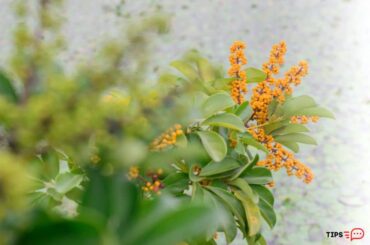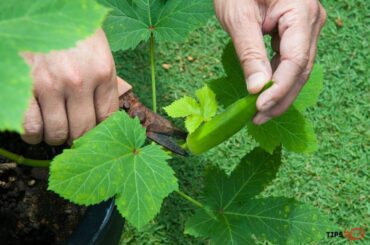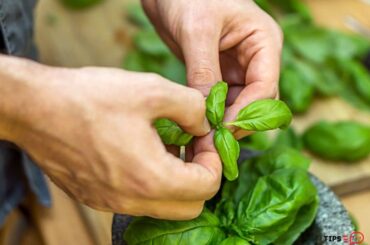For sure, you can easily find valuable ingredients to prepare a nutrient-rich Homemade fertilizer for bougainvillea from your kitchen trash bin! If you’re inspired by eco-friendly gardening and want to save your wallet at the same time, then this article is for you.

If you’re looking for a houseplant that stays spectacularly lush and vibrant all year round, then bougainvillea would be the perfect option for you. In fact, they are climbers that adapt to tropical climates.
You can grow them as climbers clinging to walls, large trees, or small shrubs. Did you know the vivid structures of bougainvillea are actually modified leaves called bracts? The real bougainvillea flowers are the tiny white color flowers surrounded by those bracts.
A well-nourished bougainvillea shrub will give a nice display of flower fiesta. Addressing the nutrient needs of bougainvillea is not tricky.
What is the homemade fertilizer for bougainvillea?
Most plant parents prefer to use natural fertilizers to treat bougainvillea because of the negative effects associated with chemical fertilizers.
Other than fulfilling the nutrient requirements of the plant, you can improve the soil structure, encourage the growth of beneficial soil microflora, and minimize the risk of salt build-ups if you use natural fertilizers for your plants.
Bougainvillea prefers to root in soil that contains plenty of nutrients and organic matter. Well, as a matter of fact, compost is the best natural fertilizer for your bougainvillea. It is 100% natural.
Compost is a mixture of decaying natural materials like leaves, fruit wastes, vegetable wastes, eggshells, grass clippings, and so on.
During the putrefaction and decomposition, most of the complex organic compounds are broken down into their key elements so, what you have as compost is a rich blend of essential nutrients required for the plant growth and development.
Natural fertilizers release nutrients slowly at a sustainable rate so bougainvillea can absorb them as needed for a sufficient period of time. Therefore, you don’t have to feed bougainvillea frequently if you use compost for them.
Furthermore, compost is a strong source of nitrogen, which is an important nutrient for bougainvillea, especially during its vegetative growth phase.
Because the majority of the foliage and root system develop during the vegetative growth phase, it is critical to feed your bougainvillea a nitrogen-rich diet during this time. This can be accomplished by mixing a handful of compost with the soil.
Be mindful that if you solely depend on compost for bougainvillea as it is not an ideal source of phosphorus which is crucial for blooming. Actually, it has a very little load of phosphorus.
So, how do you enrich the soil with phosphorus? It is easy. You can mix a little more cow manure or horse manure with compost in order to increase the phosphorus content, especially during the blooming phase of bougainvillea.

Are coffee grounds good for bougainvillea?
Definitely, bougainvillea can benefit from coffee grounds. As a fertilizer, coffee grounds play several important functions upon having a healthy bougainvillea plant. It is a valuable source of organic material and elements that are crucial for plant growth such as nitrogen, phosphorus, calcium, potassium, iron, and magnesium.
Further, it can improve water retention and aeration of the soil, and at the same time, it attracts earthworms.
Coffee is one of the extensively used soil amendments that help to make the soil acidic. Generally, bougainvillea needs acidic soil (pH 5.5 – 6.0) to grow. If the acidity level of your garden soil is not compatible with the recommended acidity level for bougainvillea, do not worry, a pinch of coffee ground will do that job.
Anyway, it’s beneficial to have a thorough understanding of the impacts of coffee grounds as a pH adjuster. Unlike leftover coffee grounds, fresh coffee grounds can lower the pH of the soil drastically. Therefore, make sure you’re not using too much fresh coffee grounds to the point where the pH of the soil is lowered, perhaps harming your plant.
There are two ways that you can apply coffee grounds to bougainvillea; either you can directly sprinkle a thin layer of coffee grounds around the root zone or you can spray brewed coffee to the soil.
Next time reconsider before you discard leftover coffee grounds from your cup of coffee. You can use them to make the soil fertile to have a gorgeous bougainvillea bush. If you don’t make coffee often at your home, you can just ask from a coffee shop. Most of them are willing to give their leftover coffee grounds away.
Is Epsom salt good for bougainvillea?
Well, Epsom salt, or in other words magnesium sulfate works with bougainvillea. It increases magnesium and sulfur levels in the soil for healthy plant growth.
Magnesium and sulfur in Epsom salt aid in the formation of chlorophyll and the production of more blooms. With Epsom salts, you can ensure the lush foliage of bougainvillea. If you want to grow bougainvillea as a shrub, Epsom salt will be a fantastic choice.
After dissolving Epsom salt in water, it is simple to apply to bougainvillea. If you use it as a foliar spray, the plant will absorb the nutrients quickly rather than pouring it onto the roots.
Are eggshells good for bougainvillea?
Eggshells are an excellent fertilizer to make the soil rich in calcium, an important mineral for strengthening cell walls and for a robust root system. Whenever there are enough calcium deposits in the soil, roots can grow faster and stronger.
The shells also contain phosphorus, potassium, and magnesium that help plants to grow happy and healthy.
Apart from that, the shells help control some pests. Sharp edges and lingering smell of crushed eggshells keep pests like snails and slugs away from your plants. Like coffee grounds you can use eggshells to increase the acidity of the soil.
The protein sap of eggs can encourage the growth of pathogenic microbes including bacteria and fungi. If they invade your plant there will be severe consequences. Thus, it is advisable to wash the eggshells with warm water and then dry them before using to prevent the growth of disease vectors.
There are several ways that you can use eggshells to fertilize your bougainvillea; crushed shells, eggshell powder or eggshell tea. Generally, smaller the size, the faster the nutrient leaches into the soil from the shells.
Therefore, try to use eggshell powder as much as possible. You can bake shells at 350 degrees until you see light brown color in shells. This will make the grinding process easier.
Simply, bury a few teaspoons of crushed or powdered eggshells in a hole closer to the roots of your bougainvillea plants. As they decompose, the nutrients in the shells will leach into the soil to be taken up by the plant. Alternatively, you can mix a handful of powdered eggshells with compost to be used for bougainvillea.
If you want to get quick results, boil a few tablespoons of eggshells powder in water for a few minutes and let it cool. During this process, the nutrients will be extracted into the water. Strain the water into a clean jar and you can use this water to spray your bougainvillea to support optimal growth.

Is banana peel good for bougainvillea?
Due to the rich nutrient composition, among plant growers, banana peels are a mandatory material for plants’ feed to assure healthy plant growth. In fact, banana peels are the richest source of potassium; one of three major elements required for plant growth and development.
Potassium is recognized as a macronutrient since plants need it in large amounts during their life cycle. It has many important functions within plants; distributing nutrients, regulating enzymes, encouraging new growth, and strengthening stems are some of them.
Furthermore, the peels contain magnesium, calcium, phosphorus, and sodium that contribute to increase root growth, maintain turgor, and combat plant diseases.
Chop banana peels into small pieces and bury them near your bougainvillea plant or you can mix banana peels into the compost pile that you’re going to use your bougainvillea. They will release nutrients into the soils as they break down.
Banana peel tea can be prepared by fermenting peels in water for a week or two. You can get a nutrient-dense liquid fertilizer that is ready to use for your bougainvillea. Spray the water into the soil so plants can absorb the nutrients immediately.
Is cow manure good for bougainvillea?
In short, yes you can use cow manure for bougainvillea. It is a valuable source of organic materials and other vital nutrients including nitrogen, phosphorus, magnesium, calcium, and sulfur that helps plants to grow happily.
The incorporation of cow manure into the soil enhances soil fertility, soil structure, and water drainage. Since cow manure can help water retention too, bougainvillea are potent to thrive during hot and dry climates.
Due to the rich profile of organic matter, the use of cow manure for your soil will enhance bacterial diversity in the soil which can get more benefits.
Remember that, the direct application of raw cow manure may be detrimental to the plant health. Raw cow manure is highly acidic and it may contain excessive loads of nutrients than the plant’s actual requirement.
So, the plant may be burnt if you use raw cow manure directly for your plants. If you want to use cow manure for bougainvillea, composting them is the best way to go.
How often do you fertilize bougainvillea?
In general, natural fertilizers can be considered slow-releasing fertilizers. They gradually replenish nutrient reservoirs in the soil over a period of time. Therefore, frequent application of natural fertilizers for bougainvillea is unnecessary.
It is recommended to fertilize bougainvillea with organic fertilizers every two to three months, particularly during the growing season of the plant. Typically, bougainvillea actively grows in hot climates; spring and summer.
In cooler climates, the plant growth occurs at a very lower rate thus, you may not need to apply fertilizers when the plant isn’t actively growing.
The primary rule behind the fertilization of bougainvillea is that you should fertilize them with a nitrogen-rich diet especially during the vegetative growth, and a phosphorus-rich diet during the flowering period.

How do you increase bougainvillea flowering?
A fully bloomed bougainvillea bush will add a luxurious beauty to your home garden. The key to assure bougainvillea to bloom to its fullest is the proper care for them.
Expose bougainvillea to direct sunlight
Make sure that your bougainvillea plants are sitting in full sunlight. Bougainvillea is happy to bloom once they unveil direct skylights. For the best results, expose bougainvillea to the direct sun at least for 6 hours per day.
Perhaps, you may have experienced shorter flowering periods in your indoor bougainvillea. To produce flowers more and more what you can do is placing your indoor bougainvillea near a sunny window, ideally closer to a south-facing or west-facing window so the plant will bathe in plenty of sunlight.
Maintain the optimal temperature
Bougainvillea loves warmer climates to grow. If you can remember, bougainvillea is a tropical plant. They thrive in hardiness zones 9 to 11. Avoid chilling your plant temperature below 30 degrees as it can possibly stunt plant growth and produce fewer flowers. If you can, bring your potted bougainvillea inside, if they are continuously exposed to cooler temperatures.
Feed the plants with a phosphorus dense diet
Phosphorus is a vital nutrient for any flowering plant. If the plant is not receiving enough phosphorus from its soil, the plant will struggle to bloom for sure. Make sure that you are feeding your plants with phosphorus-rich sources such as livestock manure.
To wrap up
A well-kept bougainvillea vine would offer a pop of color to your home’s decor. With a few common household ingredients, you can make homemade fertilizer for bougainvillea. Next time, don’t throw away debris; you can use it to help your bougainvillea grow stronger and produce more blooms.
Read Next : 06 Best Homemade Fertilizer For Ferns




